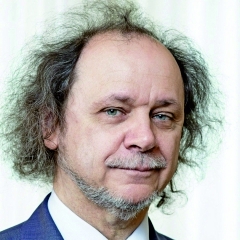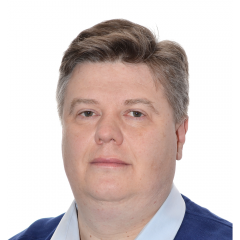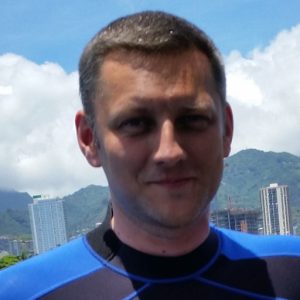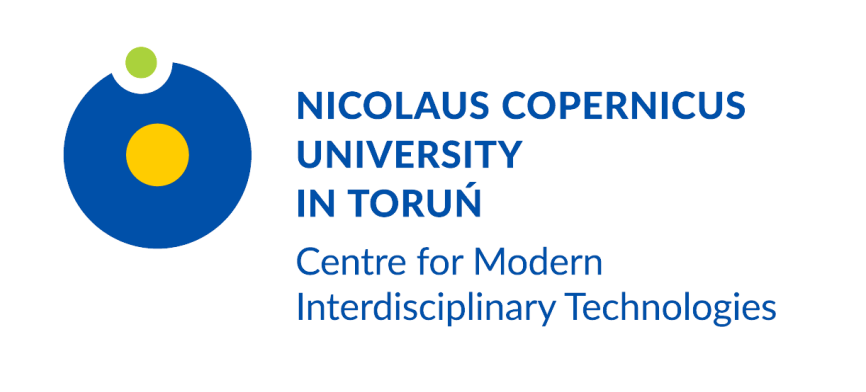 Włodzisław Duch, head of Neurocognitive Laboratory
Włodzisław Duch, head of Neurocognitive Laboratory
Google by name, or directly: http://www.is.umk.pl/~duch
Prof. Włodzisław Duch is the head of the Neurocognitive Laboratory in the Center of Modern Interdisciplinary Technologies, and the Neuroinformatics and Artificial Intelligence group in the University Centre of Excellence Dynamics, Mathematical Analysis and Artificial Intelligence. For many years he has been running Department of Informatics at Nicolaus Copernicus University, Torun, Poland. Currently his laboratory is hosting Polish node of the International Neuroinformatics Coordination Facility (INCF).
In 2014-15 he served as a deputy minister for science and higher education in Poland, and in 2011-14 as the Vice-President for Research and ICT Infrastructure at his University. Before that he worked as the Nanyang Visiting Professor (2010-12) in the School of Computer Engineering, Nanyang Technological University, Singapore where he also worked as a visiting professor in 2003-07. Member of the College of Fellows, International Neural Network Society Board of Governors, former President of the European Neural Network Society, for two terms (2006-2008-2011).
For more information please see his short CV or or a longer CV, or just type “Wlodek Duch” in Google.
(alphabetical order)
Beata Augustyńska PhD, DSc (habilitation) is specialist in biochemistry and medical biology, head of the Department of Biochemistry, Faculty of Medicine, Ludwik Rydygier Collegium Medicum, Nicolus Copernicus University in Bydgoszcz, Poland. She has received her PhD in Medical Academy in Bydgoszcz, Poland. Her habilitation thesis concerned the clinical picture, diagnosis and treatment of the liver difunction as a result of addiction to alcohol. Head and investigator in many research projects, supervisor of many MSc thesis. Editor-in-Chief of Medical and Biological Sciences journal. Coordinator of many initiatives popularizing medical sciences, including Medical Wednesday and Medicalia.
 Bibianna Bałaj PhD is research associate at Department of Cognitive Science and Epistemology, Nicolaus Copernicus University in Toruń, and postdoctoral researcher at Center for Modern Interdiscyplinary Technologies, Nicolaus Copernicus University in Toruń. She has a Masters degree and a doctorate in psychology. She is involved as researcher in several scientific projects concerning cognitive science, eye-tracking and developmental psychology. She also teaches courses on neuroeconomy at Nicolaus Copernicus University, Poland. Her scientific interests focus on cognitive psychology.
Bibianna Bałaj PhD is research associate at Department of Cognitive Science and Epistemology, Nicolaus Copernicus University in Toruń, and postdoctoral researcher at Center for Modern Interdiscyplinary Technologies, Nicolaus Copernicus University in Toruń. She has a Masters degree and a doctorate in psychology. She is involved as researcher in several scientific projects concerning cognitive science, eye-tracking and developmental psychology. She also teaches courses on neuroeconomy at Nicolaus Copernicus University, Poland. Her scientific interests focus on cognitive psychology.
 Krzysztof Dobosz MSc is an research and teaching assistant at the Faculty of Physics, Astronomy, and Informatics at the Nicolaus Copernicus University in Toruń, Poland. He was graduated in 2006 from the Nicolaus Copernicus University with a MSc degree in Computer Science. From 2006 to 2011 he pursued doctoral studies at the Nicolaus Copernicus University and currently is working on a Ph.D dissertation devoted to visualization and analysis of neurodynamics in complex dynamical systems based on neural networks theory. His main research areas include: neuroscience (especially neuroinformatics), artificial and computational intelligence, machine learning, and data mining.
Krzysztof Dobosz MSc is an research and teaching assistant at the Faculty of Physics, Astronomy, and Informatics at the Nicolaus Copernicus University in Toruń, Poland. He was graduated in 2006 from the Nicolaus Copernicus University with a MSc degree in Computer Science. From 2006 to 2011 he pursued doctoral studies at the Nicolaus Copernicus University and currently is working on a Ph.D dissertation devoted to visualization and analysis of neurodynamics in complex dynamical systems based on neural networks theory. His main research areas include: neuroscience (especially neuroinformatics), artificial and computational intelligence, machine learning, and data mining.
 Joanna Dreszer Drogorób PhD is teaching and research assistant at Department of Cognitive Science and Epistemology, Nicolaus Copernicus University in Toruń, and researcher at Center for Modern Interdiscyplinary Technologies, Nicolaus Copernicus University in Toruń. She has a Masters degree and a doctorate in psychology. She is involved as researcher in several scientific projects concerning cognitive science and developmental psychology. She also teaches courses on neuropsychology, neurorehabilitation and neuroimaging techniques at Nicolaus Copernicus University, Poland. Her scientific interests focus on developmental processes and disorders, time perception and neuroimaging of sensory and cognitive processes.
Joanna Dreszer Drogorób PhD is teaching and research assistant at Department of Cognitive Science and Epistemology, Nicolaus Copernicus University in Toruń, and researcher at Center for Modern Interdiscyplinary Technologies, Nicolaus Copernicus University in Toruń. She has a Masters degree and a doctorate in psychology. She is involved as researcher in several scientific projects concerning cognitive science and developmental psychology. She also teaches courses on neuropsychology, neurorehabilitation and neuroimaging techniques at Nicolaus Copernicus University, Poland. Her scientific interests focus on developmental processes and disorders, time perception and neuroimaging of sensory and cognitive processes.
 Marek Grochowski PhD is an teaching and research assistant at the Faculty of Physics, Astronomy, and Informatics at the Nicolaus Copernicus University. He received the MSc degree in physic from Nicolaus Copernicus University in 2003 and PhD in computer science from Institute of Computer Science of the Polish Academy of Sciences in 2013. His research nterests span several areas of computational intelligence including machine learning, artificial neural networks, feature selection and extraction, meta-learning and prototype based methods.
Marek Grochowski PhD is an teaching and research assistant at the Faculty of Physics, Astronomy, and Informatics at the Nicolaus Copernicus University. He received the MSc degree in physic from Nicolaus Copernicus University in 2003 and PhD in computer science from Institute of Computer Science of the Polish Academy of Sciences in 2013. His research nterests span several areas of computational intelligence including machine learning, artificial neural networks, feature selection and extraction, meta-learning and prototype based methods.
Sławomir Grzelak PhD is assistant professor at Institute of Physics, Nicolaus Copernicus University in Toruń, and researcher at Center for Modern Interdiscyplinary Technologies, Nicolaus Copernicus University in Torun. He received the PhD degree in electronics (metrology) from Military University of Technology in 2006. His research areas focus on novel digital technologies and metrology of time.
 Małgorzata Gut PhD is a teacher and researcher at Department of Cognitive Science and Epistemology, Nicolaus Copernicus University in Toruń, and researcher at Center for Modern Interdiscyplinary Technologies, Nicolaus Copernicus University in Toruń. She has a Masters degree in biology and psychology and a doctorate in biological sciences. She is involved as researcher in several scientific projects concerning cognitive science and neurobiology basis of hand lateralization. She also teaches courses on psychology, cognitive neuroscience, statistics and neuroimaging techniques at Nicolaus Copernicus University, Poland. Her scientific interests focus on spatial-numerical association and its neurobiological basis (especially the SNARC effect), dyscalculia, and relationship between hand dominance and the brain lateralization of motor and cognitive functions (especially attention).
Małgorzata Gut PhD is a teacher and researcher at Department of Cognitive Science and Epistemology, Nicolaus Copernicus University in Toruń, and researcher at Center for Modern Interdiscyplinary Technologies, Nicolaus Copernicus University in Toruń. She has a Masters degree in biology and psychology and a doctorate in biological sciences. She is involved as researcher in several scientific projects concerning cognitive science and neurobiology basis of hand lateralization. She also teaches courses on psychology, cognitive neuroscience, statistics and neuroimaging techniques at Nicolaus Copernicus University, Poland. Her scientific interests focus on spatial-numerical association and its neurobiological basis (especially the SNARC effect), dyscalculia, and relationship between hand dominance and the brain lateralization of motor and cognitive functions (especially attention).
 Tomasz Komendziński PhD is senior lecturer at Department of Cognitive Science and Epistemology, Nicolaus Copernicus University in Toruń, and researcher at Center for Modern Interdiscyplinary Technologies, Nicolaus Copernicus University in Torun. He is the initiator, co-creator and coordinator of InteRDoCTor research team, well known from many previous research projects and conferences. She has a Masters degree and a doctorate in philosophy. He is involved as researcher in several scientific projects concerning philosophy and cognitive science. He also teaches courses on philosophy and cognitive science at Nicolaus Copernicus University, Poland. His scientific interests focus on americal philosophy, human perception, sensory and cognitive processes.
Tomasz Komendziński PhD is senior lecturer at Department of Cognitive Science and Epistemology, Nicolaus Copernicus University in Toruń, and researcher at Center for Modern Interdiscyplinary Technologies, Nicolaus Copernicus University in Torun. He is the initiator, co-creator and coordinator of InteRDoCTor research team, well known from many previous research projects and conferences. She has a Masters degree and a doctorate in philosophy. He is involved as researcher in several scientific projects concerning philosophy and cognitive science. He also teaches courses on philosophy and cognitive science at Nicolaus Copernicus University, Poland. His scientific interests focus on americal philosophy, human perception, sensory and cognitive processes.
 Monika Lewandowska PhD is a research assistant at the Bioimaging Research Center of the Institute of Physiology and Pathology of Hearing, Poland. She has a Masters degree in psychology (speciality: clinical neuropsychology) at the WarsawUniversity and a doctorate in biological sciences from the Nencki Institute of Experimental Biology, Poland. She is currently principal researcher for several project aimed at developing new methods for neurorehabilitation and application of the EEG and fMRI and EEG/fMRI to investigate neuroplasticity of the human brain. She also teaches courses on neuropsychology, neurorehabilitation and neuroimaging techniques at Nicolaus Copernicus University, Poland. Her scientific interests focus on central auditory processing disorders, tinnitus, time perception and neuroimaging of sensory and cognitive processes.
Monika Lewandowska PhD is a research assistant at the Bioimaging Research Center of the Institute of Physiology and Pathology of Hearing, Poland. She has a Masters degree in psychology (speciality: clinical neuropsychology) at the WarsawUniversity and a doctorate in biological sciences from the Nencki Institute of Experimental Biology, Poland. She is currently principal researcher for several project aimed at developing new methods for neurorehabilitation and application of the EEG and fMRI and EEG/fMRI to investigate neuroplasticity of the human brain. She also teaches courses on neuropsychology, neurorehabilitation and neuroimaging techniques at Nicolaus Copernicus University, Poland. Her scientific interests focus on central auditory processing disorders, tinnitus, time perception and neuroimaging of sensory and cognitive processes.
 Jacek Matulewski PhD is physicist interested in quantum optics. His habilitation thesis concerned the interaction of atom systems with ultra strong attosecond laser pulses. He is also the programmer (C++, C# and other programming languages), mainly interested in numerical simulations and 3D graphics. Additionally he graduated the philosophy (culture theory). Recently he became interested in cognitive trainings and computer supported diagnosis and therapy.
Jacek Matulewski PhD is physicist interested in quantum optics. His habilitation thesis concerned the interaction of atom systems with ultra strong attosecond laser pulses. He is also the programmer (C++, C# and other programming languages), mainly interested in numerical simulations and 3D graphics. Additionally he graduated the philosophy (culture theory). Recently he became interested in cognitive trainings and computer supported diagnosis and therapy.
 Emilia Mikołajewska PhD is physiotherapist and scientist, senior assistant in Rehabilitation Clinic, Military Clinical Hospital No. 10 with Polyclinic in Bydgoszcz, member of the International-Interdisciplinary Research on Disorders for Consciousnes in Toruń (InteRDoCTor) research team. She has received her PhD from Medical University in Poznań in 2007. She has authored ten books and more than 250 articles and chapters in the area of rehabilitation and physiotherapy, especially neurorehabilitation and neurologic physiotherapy. She is serving as an Editorial Board member in five journals and reviewer in 29 scientific journals and several book chapters. She also teaches postgraduate courses on neurorehabilitation and assistive technology and acts as supervisor of specialization candidates. Her research interests cover areas: neurorehabilitation of adult patients, including patients with disorders of consciousness, neurorehabilitation of children, increasing of patients’ quality of life using: assistive devices, telemedicine, telerehabilitation, cybertherapy, rehabilitative robotics, applications of IT, AI and integrated systems in medicine, co-operation within therapeutic multidisciplinary team, evidence based medicine in clinical practice, and applications of biomedical engineering in rehabilitation.
Emilia Mikołajewska PhD is physiotherapist and scientist, senior assistant in Rehabilitation Clinic, Military Clinical Hospital No. 10 with Polyclinic in Bydgoszcz, member of the International-Interdisciplinary Research on Disorders for Consciousnes in Toruń (InteRDoCTor) research team. She has received her PhD from Medical University in Poznań in 2007. She has authored ten books and more than 250 articles and chapters in the area of rehabilitation and physiotherapy, especially neurorehabilitation and neurologic physiotherapy. She is serving as an Editorial Board member in five journals and reviewer in 29 scientific journals and several book chapters. She also teaches postgraduate courses on neurorehabilitation and assistive technology and acts as supervisor of specialization candidates. Her research interests cover areas: neurorehabilitation of adult patients, including patients with disorders of consciousness, neurorehabilitation of children, increasing of patients’ quality of life using: assistive devices, telemedicine, telerehabilitation, cybertherapy, rehabilitative robotics, applications of IT, AI and integrated systems in medicine, co-operation within therapeutic multidisciplinary team, evidence based medicine in clinical practice, and applications of biomedical engineering in rehabilitation.
More: https://www.emiliamikolajewska.com/
 Dariusz Mikołajewski MSc Eng, PhD candidate is engineer and scientist, specialist in IT, applications of IT in medical sciences, biocybernetics, and biomedical engineering. He received the MSc degree in electronics from Military University of Technology in 1997. He also graduated from four postgraduate studies: digital telecommunication (2002), computer networks and internet applications (2004), project management (2012), manager of R&D projects (2014). He works for three research centers: 1) Institute of Mechanics and Applied Computer Science, Kazimierz Wielki University in Bydgoszcz, 2) Department of Informatics, Nicolaus Copernicus University in Toruń, 3) Centre for Modern Interdisciplinary Technologies, Nicolaus Copernicus University in Toruń. He is also member of the InteRDoCTor research team. Author of one houndred articles in the area of medical IT, biocybernetics, and biomedical engineering.
Dariusz Mikołajewski MSc Eng, PhD candidate is engineer and scientist, specialist in IT, applications of IT in medical sciences, biocybernetics, and biomedical engineering. He received the MSc degree in electronics from Military University of Technology in 1997. He also graduated from four postgraduate studies: digital telecommunication (2002), computer networks and internet applications (2004), project management (2012), manager of R&D projects (2014). He works for three research centers: 1) Institute of Mechanics and Applied Computer Science, Kazimierz Wielki University in Bydgoszcz, 2) Department of Informatics, Nicolaus Copernicus University in Toruń, 3) Centre for Modern Interdisciplinary Technologies, Nicolaus Copernicus University in Toruń. He is also member of the InteRDoCTor research team. Author of one houndred articles in the area of medical IT, biocybernetics, and biomedical engineering.
Sebastian Orzeł PhD is now a research assistant professor with the Interdisciplinary Centre of Modern Technologies. He received the MSc degree in Mathematics in 2009, the MSc degree in Economathematics in 2011, and the PhD degree in 2014, from Wroclaw University of Technology, Poland. In 2009, the Polish Mathematical Society awarded his master’s thesis. He received the Hugo Steinhaus award in mathematical sciences in 2012. From 2011 to 2013 he was working with scientists from KGHM Cuprum sp. z o.o., Wroclaw, Poland, as part of “An enterprising Phd student” project. His main research interest is modeling of anomalous diffusion, subordinated stochastic processes and recently applications of mathematics to brain signal processing.
 Tomasz Piotrowski PhD is an assistant professor at the Faculty of Physics, Astronomy, and Informatics at the Nicolaus Copernicus University. He received the MSc degree in Mathematics from Silesian University of Technology, Poland, in 2004, the MSc degree in Information Processing & Neural Networks from King’s College London, UK, in 2005, and the PhD degree from Tokyo Institute of Technology, Japan, in 2008. In 2008 he has been also a member of the Amari Research Unit, RIKEN, Japan. From 2009 to 2010 he has been with Comarch SA, Poland, and from 2010 to 2011 he worked at the start-up IT company at the Krakow Technology Park, Poland. From 2011, his main research interest is in application of robust estimation methods to brain signal processing.
Tomasz Piotrowski PhD is an assistant professor at the Faculty of Physics, Astronomy, and Informatics at the Nicolaus Copernicus University. He received the MSc degree in Mathematics from Silesian University of Technology, Poland, in 2004, the MSc degree in Information Processing & Neural Networks from King’s College London, UK, in 2005, and the PhD degree from Tokyo Institute of Technology, Japan, in 2008. In 2008 he has been also a member of the Amari Research Unit, RIKEN, Japan. From 2009 to 2010 he has been with Comarch SA, Poland, and from 2010 to 2011 he worked at the start-up IT company at the Krakow Technology Park, Poland. From 2011, his main research interest is in application of robust estimation methods to brain signal processing.
 Oleksandr Sokolov joined Informatics Department in Nicolaus Copernicus University in Toruń. Poland, as a professor in 2012, before that he was the ehad of Informatics Department in Kharkiv Aviation Institute, Ukraine, and a member of Academy of Navigation and Motion Control. His areas of expertise include applied mathematics, intelligent control systems, expert systems and knowledge bases, decision making, data mining, modelling of dynamic process with fuzzy approach.
Oleksandr Sokolov joined Informatics Department in Nicolaus Copernicus University in Toruń. Poland, as a professor in 2012, before that he was the ehad of Informatics Department in Kharkiv Aviation Institute, Ukraine, and a member of Academy of Navigation and Motion Control. His areas of expertise include applied mathematics, intelligent control systems, expert systems and knowledge bases, decision making, data mining, modelling of dynamic process with fuzzy approach.
Piotr Weber, MSc Chemistry and PhD candidate. His bachelor thesis and master’s thesis focuse on the mathematical foundations of quantum chemistry. In particular, convergenceof hydrogen energy operator’s mean value and some other operator’s mean value, that are calculated Rusing finite gaussian functional basis set. Now his research interests focus on the applications of mathematical modeling in physics, chemistry and biology. He is a specialist in the analysis of physiological signals. His favorite area of mathematics is the theory of partial differential equations of fractional order. He works for two researh centers: Centre for Modern Interdisciplinary Technologies, Nicolaus Copernicus University and Collegium Medicum, Nicolaus Copernicus University.
 Mateusz Wilk PhD student. He received the MSc degree in Mathematics and the Licentiate degree in Economics from Nicolaus Copernicus University. His interests include statistics, stochastic processes, mathematical modeling, and data mining.
Mateusz Wilk PhD student. He received the MSc degree in Mathematics and the Licentiate degree in Economics from Nicolaus Copernicus University. His interests include statistics, stochastic processes, mathematical modeling, and data mining.
 Tomasz Wolak PhD is a head of the Bioimaging Research Center and Senior Research Fellow at the World Hearing Center of Institute of Physiology and Pathology of Hearing in Kajetany, Poland. He has a Masters degree and a doctorate at Medical and Nuclear Electronics Division of the Warsaw University of Technology. He actively participated in numerous research projects on application of an fMRI technique for studying sensory and cognitive processes in humans. He was involved in the formation of the Laboratory of Diagnostic Imaging of the Institute of Physiology and Pathology of Hearing. In March 2009 the Laboratory has evolved into the Bioimaging Research Center, equipped with modern 3Tmagnetic resonance scanner. His main interests are functional magnetic resonance imaging, brain image segmentation, image analysis and visualization, language and auditory functional studies. He collaborated with many clinical and scientific centers in Poland, where he introduced the technique of fMRI into clinical practice. He has13 years of experience in the subject of neuroimaging, more than 2 thousand performed studies and analyzes, participated in several research projects related to the fMRI and EEG/fMRI.
Tomasz Wolak PhD is a head of the Bioimaging Research Center and Senior Research Fellow at the World Hearing Center of Institute of Physiology and Pathology of Hearing in Kajetany, Poland. He has a Masters degree and a doctorate at Medical and Nuclear Electronics Division of the Warsaw University of Technology. He actively participated in numerous research projects on application of an fMRI technique for studying sensory and cognitive processes in humans. He was involved in the formation of the Laboratory of Diagnostic Imaging of the Institute of Physiology and Pathology of Hearing. In March 2009 the Laboratory has evolved into the Bioimaging Research Center, equipped with modern 3Tmagnetic resonance scanner. His main interests are functional magnetic resonance imaging, brain image segmentation, image analysis and visualization, language and auditory functional studies. He collaborated with many clinical and scientific centers in Poland, where he introduced the technique of fMRI into clinical practice. He has13 years of experience in the subject of neuroimaging, more than 2 thousand performed studies and analyzes, participated in several research projects related to the fMRI and EEG/fMRI.

 ul. Wileńska 4, 87-100 Toruń
ul. Wileńska 4, 87-100 Toruń